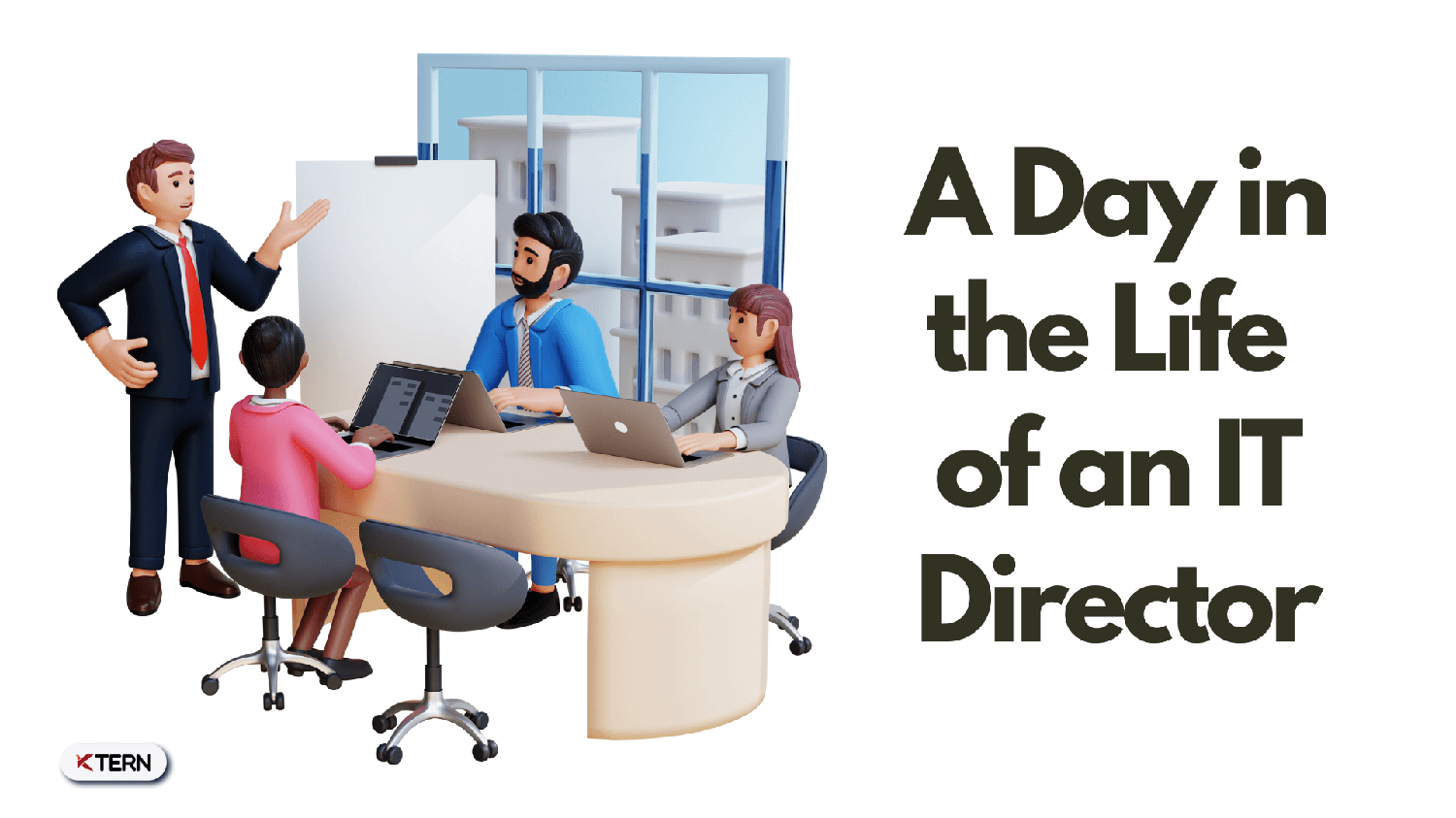A Day in the Life of an IT Director
Being an IT Director is a challenging and rewarding role that requires a broad range of skills and knowledge. The IT Director is the head of the IT department and is responsible for managing and mentoring IT staff, developing and implementing IT policies and procedures, managing IT budgets and resources, and ensuring the security and privacy of the organization's data.
They also play a vital role in identifying and implementing new technologies to improve the organization's IT infrastructure.
In this article, we will delve into the life of an IT Director, exploring their daily tasks, challenges, and responsibilities. We will also look at how they manage their time and workload. Additionally, we will also discuss how the implementation of tools like KTern.AI can help improve the lives of IT Directors and make their job more manageable and enjoyable.
Table of Contents
- Tasks performed on daily basis
- Roles and Responsibilities for an IT Director
- A typical workday in the organisation
- Time Management Advice for an IT Director
- How to achieve a good work life balance
- What motivates the IT Director to like the job
- Most fascinating project the IT Director has undertaken
- Activities Performed by an IT Director
- Problems that faced by an IT Director
- Favourite Aspect of Being an IT Director
- Life Before KTern.AI
- Life After KTern.AI
- Conclusion
Tasks performed on daily basis
A day in the life of an IT Director is filled with a wide variety of tasks that are essential to the smooth operation of the organization.
Some of the most common tasks performed on a daily basis include reviewing and analysing system performance, overseeing the maintenance and upgrades of IT systems, managing and mentoring IT staff, collaborating with other departments to understand their IT needs and provide solutions, monitoring and managing IT budgets.

Identifying and implementing new technologies, ensuring the security and privacy of the organization's data, managing and monitoring IT projects, staying up-to-date with industry trends and developments, troubleshooting and resolving technical issues, and participating in meetings and presentations to discuss IT initiatives with senior management and stakeholders.
These tasks require a combination of technical skills, business acumen, and leadership abilities, making it a challenging but rewarding role for those who enjoy working with technology and making a positive impact on the organization.
Roles and Responsibilities for an IT Director
Strategic Planning: An IT Director is responsible for developing and implementing the organization's IT strategy and vision. They must stay up-to-date with the latest technologies and trends to ensure that the organization's IT infrastructure is aligned with its business goals and objectives.
Budgeting and Financial Management: IT Directors are responsible for managing the IT budget and allocating resources to ensure that the organization's IT infrastructure is cost-effective and efficient. They must also ensure that IT projects are completed within budget and on time.
Team Management: An IT Director is responsible for managing and mentoring the IT staff to ensure that they have the necessary skills and knowledge to meet the organization's IT needs.
Project Management: IT Directors are responsible for overseeing the planning, execution, and delivery of IT projects, and ensuring that they are completed on time and within budget.
Risk Management: IT Directors are responsible for identifying and managing potential IT risks and ensuring that the organization's IT infrastructure is protected from potential threats.
A typical workday in the organisation
A typical workday in the organization for an IT Director can vary depending on the specific organization and industry, but generally, it may involve:
Starting the day by reviewing and responding to emails, messages, and notifications to stay on top of important updates and issues that may have arisen overnight.
Participating in a daily or weekly meeting with the IT team to discuss ongoing projects and address any issues that need to be addressed.

Reviewing system performance and identifying areas for improvement, troubleshoot and resolving technical issues as they arise.
Meeting with other departments and stakeholders to discuss their IT needs, providing solutions and ensure the alignment of IT strategy with the organization's overall goals and objectives.
Reviewing and approving IT-related requests and expenditures, ensuring that they align with the IT budget and overall organizational goals.
Participating in project planning and management meetings to ensure that IT projects are on track and completed within budget and on time. Keeping abreast of industry developments and emerging technologies through research and attending relevant conferences and events.
At the end of the day, reviewing the progress on various initiatives and setting priorities for the following day. Overall, an IT Director's workday involves a mix of hands-on technical work, strategic planning, and project management, as well as interactions with different departments and stakeholders to ensure that the organization's IT infrastructure is aligned with its overall goals and objectives.
Time Management Advice for an IT Director
Prioritize tasks: IT Directors should prioritize their tasks based on the urgency and importance of each task. This will help them to focus on the most important tasks first and ensure that they are completed on time.
Delegate tasks: IT Directors should delegate tasks to their team members whenever possible to ensure that they are not overwhelmed with work. This will also help to develop the skills of their team members.
Use technology: IT Directors should use technology to help them manage their time more effectively. Tools such as calendar apps, project management software, and time tracking apps can help them to stay organized and on schedule.
How to achieve a good work life balance
As an IT Director, the role is demanding and the responsibilities can be overwhelming. It is essential to find a balance between work and personal life to avoid burnout and maintain a healthy lifestyle. Here are some tips on how to achieve a good work-life balance as an IT Director.
Set boundaries: IT Directors should set clear boundaries between work and personal life to avoid burnout. This may include setting a fixed time to stop working each day and not checking work emails outside of working hours.
Take breaks: Regular breaks are important for both physical and mental health. IT Directors should schedule regular breaks throughout the day to recharge and refresh their mind. This can include taking a short walk, meditating, or doing a quick workout.

Prioritize self-care: Self-care activities such as exercise, healthy eating, and getting enough sleep are essential for maintaining good physical and mental health. IT Directors should make time for self-care activities to ensure that they are in good health and able to handle the demands of the job.
Create a schedule: Creating a schedule can help IT Directors to manage their time effectively. This can include scheduling personal and work activities, setting deadlines, and creating a to-do list for the day.
What motivates the IT Director to like the job
IT Directors can have the opportunity to make a real impact on the organization by improving its IT infrastructure, increasing efficiency, and reducing costs. This can be a major source of motivation for many IT Directors.
IT Directors are often faced with complex problems that require creative and innovative solutions. The challenge of problem-solving can be a major source of motivation for IT Directors.
The IT industry is constantly evolving, and IT Directors have the opportunity to learn about new technologies and trends. This can be a major source of motivation for IT Directors who are passionate about technology.
Most fascinating project the IT Director has undertaken
The most fascinating project that an IT Director may have undertaken can vary greatly depending on the organization and industry. However, some examples may include:

- Implementing a new ERP system to increase efficiency and reduce costs
- Developing a new mobile app to improve customer engagement
- Implementing a new cybersecurity system to protect the organization's data
- Leading a digital transformation initiative to modernize the organization's IT infrastructure
Activities Performed by an IT Director
As an IT Director there are a few activities that are performed by them. These activities include:

- Overseeing the day-to-day operations of the IT department
- Managing and mentoring IT staff
- Developing and implementing IT policies and procedures
- Managing IT budgets and resources
- Identifying and implementing new technologies to improve the organization's IT infrastructure
- Ensuring the security and privacy of the organization's data
- Managing vendor relationships and IT contracts
- Collaborating with other departments and stakeholders to identify IT needs and implement solutions
- Managing IT projects from conception to completion
- Staying up-to-date with the latest technologies and trends in the IT industry.
Problems faced by IT Directors
IT Directors face a variety of challenges in their role, such as balancing the need to maintain and improve existing systems with the need to implement new technologies and stay competitive in the marketplace. Managing IT budgets and resources is also a challenge, ensuring that the organization has the necessary resources to support its IT infrastructure, while also managing expenses and staying within budget.
Managing risks and compliance and keeping stakeholders updated and aligned with the organization's IT strategy is also a major concern for IT Directors.
Favourite Aspect of Being an IT Director
Many IT Directors find that their ability to make a real impact on the organization is a favourite aspect of the job.
IT Directors often find that the challenge of problem-solving is a favourite aspect of the job. The opportunity to find creative and innovative solutions to complex problems can be a major source of satisfaction for IT Directors.
The IT industry is constantly evolving, and IT Directors have the opportunity to learn about new technologies and trends.
IT Directors have the opportunity to work with a diverse group of people, including staff members, vendors, and other stakeholders. This can be a favourite aspect of the job for those who enjoy working in a collaborative environment.
Life Before KTern.AI
Life before using KTern.AI can be challenging for IT Directors in managing the IT department.

They must handle multiple tasks and projects at the same time which includes managing IT staff, managing IT budgets and resources, and ensuring the security and privacy of the organization's data. They have to spend a lot of time on manual processes, which can be time-consuming and prone to errors.
Life After KTern.AI
After implementing KTern.AI, the life of an IT Director becomes much easier. KTern.AI automates many of the manual processes and makes it easier to manage IT staff, budgets, and resources. It also provides tools for managing IT projects and ensuring the security and privacy of the organization's data.
The IT Director is now able to keep up with new technologies and industry developments more easily and quickly with the help of KTern's AI-powered knowledge base engine.
With the help of KTern.AI, IT Directors can now make data-driven decisions, and have access to real-time insights and analytics that allow them to understand the organization's IT infrastructure in greater detail.
Overall, life after KTern.AI for an IT Director is more efficient, streamlined, and data-driven, allowing them to focus more on strategic decision-making and less on manual processes.
IT Director was constantly wonders about the 5 modules of KTern.AI, which help him ease his work. The five modules include:

Conclusion
In conclusion, being an IT Director is a challenging and rewarding role that requires a broad range of skills and knowledge.
However, with the help of tools like KTern.AI, IT Directors can manage their workload more efficiently, automate manual processes and focus on the most important tasks.
With KTern.AI, IT Directors can achieve a better work-life balance and ultimately enjoy their job more.
Are you looking for a productive strategy to propel your company's transformation? If so, you can schedule a demo with us by clicking HERE. Too curious to want to learn more? Contact us so we can address all of your inquiries!




